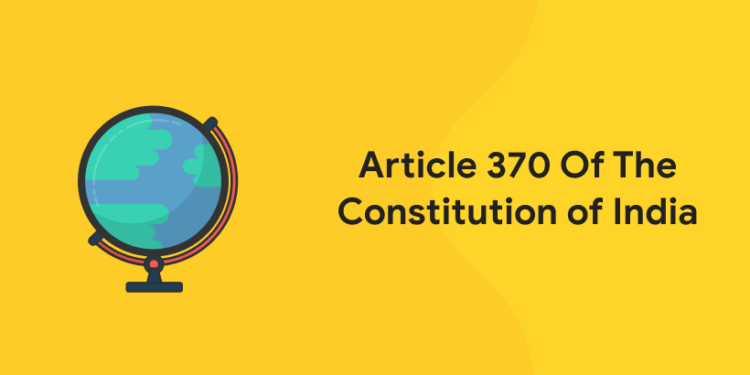Table of Contents
Article 370 of the Constitution of India has been a hot topic for discussion recently taking into account the revocation of the article which was done by the concerned organisation of the Indian government as per the presentation order. There are many people who are still confused and they do not have any idea regarding the revocation of article 370 by the Indian government because it is all complicated due to the laws and the bills that were passed in the year 2019. The bottom line of the controversy is that the special status is taken back from the Jammu and Kashmir residents and the state is now divided into two union territories. Article 370 UPSC is also one of the most trendy topics that you can get in your competitive exams. You can check out more on the subject from the blog shared below.
Check out the video lessons And Improve Your GK Now
Article 370
Article 370 of the Indian constitution states that Jammu and Kashmir which is the reason located in the Northern part of the Indian subcontinent is a special state because this part has been in a dispute between India or Pakistan and China since 1947. Jammu and Kashmir were constituted as a state in the Indian subcontinent in 1954. Jammu and Kashmir was however given a special constitution, a state flag and autonomy of internal administration as per the rules and regulations mentioned in Article 370 till 31st October 2019. Article 370 was drafted inside the Indian constitution which has a title called Temporary, Transitional AndSpecial Provisions. Article 370 provided special status to the Jammu and Kashmir state and it was still present until a presidential order was passed on 5th August 2019.
Features Of Article 370 of the Constitution
1: Who was the first woman President of India?
There are various things that you need to know in order to get knowledge regarding Article 370 of the constitution of India and given below you can check out some of the features that you need to have knowledge of regarding article 370. You can check out the features of the article from the pointers given below and then you can understand the details related to the special status that was provided to the Jammu and Kashmir state previously.
- The state of Jammu and Kashmir has their own flag and their constitution as per the rules mentioned in Article 370
- The presidential rule also cannot be imposed in the state and only the governor’s rules can be proclaimed.
- The Government of India will not be able to declare a financial emergency under Article 360 in the Jammu and Kashmir state.
- Only a national emergency can be imposed in matters of external aggression or war in the Jammu and Kashmir state.
- The Jammu and Kashmir state has its own criminal court which is titled the Ranbir penal code.
- The citizens in the state have dual citizenship.
- The term of the Indian state registration is 5 years in all of the other states but in Kashmir state, it is around 6 years.
Free UPSKILLING Courses!
Take your first step toward mastering in-demand skills, acing interviews, and securing top-tier jobs with Entri's free upskilling courses.
Start Learning!History of Article 370 in Kashmir
Jammu and Kashmir was an independent territory after India got independence in 1947 and it was governed by Maharaja Hari Singh of Jammu and Kashmir. The Maharaja decided to remain independent from India and Pakistan and then Pakistan launched a non-official war on the region to free it from the Hindu rule because it majorly consisted of Muslim people. Then the ruler of the state decided to sign an Instrument Of Accession in October 1947 in order to protect the state. However, special status was provided to the Jammu and Kashmir state as per the debates made by the people under the ruler. The constitution of the state was adopted on 17th November 1956 and it came into effect on 26 January 1957.
Revocation of Article 370 of the Constitution
On 5th August 2019, the Government of India issued a presidential order in which it was stated that all of the provisions of the Indian constitution will be applicable to the residents and the state of Jammu and Kashmir. The resolution was then passed in both of the houses of the Indian parliament with two-thirds of the majority. A new Jammu and Kashmir reorganisation act 2019 was also passed by the parliament stating that the Jammu and Kashmir state will be divided into two union territories and it will be called the union territory of Jammu and Kashmir and the union territory of Ladakh. The reorganisation then took place on 31st October 2019 and around 23 petitions were sent to the supreme court of India which challenged the Central Government’s decision to repeal Article 370 of the constitution.
Check out the mock tests And Improve Your GK Now
Entri is a learning platform which is created by well-known experts in the industry in order to provide proper knowledge related to the various competitive examinations which are present across the country. You can check out our crash courses and video lessons created by well-known experts and you can start preparing for the competitive examination of your choice while taking into account the study materials available on our platform also. Enrol now and you will be able to also take into account the mock test series available on our platform.














